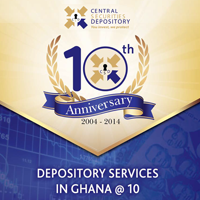 The Bank of Ghana wants universal banks to effectively play their role in reducing the dollarisation in the economy. Samuel Doe Ablordeppey report
The Bank of Ghana wants universal banks to effectively play their role in reducing the dollarisation in the economy. Samuel Doe Ablordeppey report
The acting Governor of the Bank of Ghana (BoG), Dr Kofi Wampah, said the violations include banks crediting the foreign exchange accounts of customers with proceeds from private sector exports and use them for investments and transactions abroad (externalisation) without documentation of such proceeds.
“These unauthorised externalisations of banks infringe on regulations under the Foreign Exchange Act and also undermine the central bank’s efforts of ensuring judicious use of foreign exchange resources. They constrain supplies of foreign exchange in the market, thereby putting pressure on the domestic currency and ultimately adversely affecting prices in the economy,” Dr Wampah stated.
The acting governor said at the root of the dollarisation process was the procedure for account opening during which banks did improper screening before accounts are opened, and no questions are asked before funds were received into or paid out of accounts.
Addressing a well-attended 12th annual working luncheon of banks and banking industry stakeholders in Accra, the governor minced no words in pointing out the very cause of the massive dollarisation that had hit the economy over a two-decade-long period and recently resulted in the value of the cedi plummeting very rapidly against the United States dollar and other major international currencies.
“Some banks also encourage huge over-the-counter withdrawals of foreign currencies by customers, including Forex bureaux, from FX accounts and these activities encourage dollarisation of the economy, which has the potential to weaken the effectiveness of monetary control,” Dr Wampah stated.
He reminded bankers of their responsibility towards the industry, saying “the central bank requires all banks and their staff, in line with their own code of ethics, to be highly professional and ethical in rendering services to their clients and should not be aiding or abetting the contravention of regulations.”
He stressed that such regulations formed the bedrock of the banking industry, saying: “we should not trade off short-term anticipated gains for building a robust and vibrant banking system that is necessary for supporting the medium to long-term development of industry.”
Foreign exchange market
The BoG raised concerns of violations of some provisions of the Foreign Ex Act, expressing the worry that a number of banks continue to transfer foreign exchange abroad on behalf of importers who had not fully accounted for previous outstanding transfers made without documentation.
The violations include crediting the foreign exchange accounts of customers with proceeds and used for investments and transactions abroad (externalised) without documentation of the proceeds.
The foreign exchange proceeds accrue from sources such as the export of scrap metals, gold and other merchandise.
But such externalisations deny the interbank market of Ghana of foreign exchange liquidity, hence the difficulty in sourcing forex to support domestic economic activities in a transparent manner.
Banks also give foreign currencies to some customers who do not have immediate use for the them, which practice accounts for the growing deposits in foreign exchange in relation to total deposit of banks.
With such large reserves in foreign exchange, the Bank of Ghana has observed, the banks then sit on them without releasing it to the market on the excuse that they do not want to create mis-matches between their assets and liabilities, thus creating foreign exchange liquidity.
The BoG maintains that it was in situations where there were no immediate investment avenues that the foreign exchange end up abroad in investments for negligible returns which again denies the local market foreign exchange liquidity.
“At end of June, placements and nostro balances of banks exceeded 10 per cent of total assets of banks, with several banks’ placements exceeding 100 per cent of their net worth,” Dr Wampah disclosed.
Nostro balances are the values on the accounts that local banks hold with their corresponding banks abroad, while net worth refers to what is left of a bank after taking care of all its liabilities with its total assets. The explanation therefore means that banks are increasingly keeping a large portion of their deposits and assets in foreign currencies.
Some banks also encourage huge over-the-counter withdrawals of foreign currencies by customers, including forex bureaux, from FX accounts and these activities encourage dollarisation of the economy, which has the potential to weaken the effectiveness of monetary control.
To stem the free fall of the cedi as a result of dollarisation, the central bank recently introduced measures that included banks keeping reserves in local currencies to cover any value of foreign exchange.
This has come with some costs to the banks which some are passing on to their customers, thereby reducing the rate at which bank customers operate foreign exchange accounts.
But this is where the Ghana Association of Bankers (GAB) wants the BoG to tread cautiously in implementing measures to rescue the cedi.
Its President, Mr Asare Akuffo, believes that the costs imposed on the banks as a result of the policy measures could force banks to look elsewhere to meet such costs as some could not pass them on to customers.
He called on the central bank to conduct a research and use the outcome to influence the structure of the demand from certain sectors of the economy, while working with the government to change the structure of the economy in the long term.
In the short term, however, the GAB said, laws of the country that put restrictions on forex trade such as the inability to withdraw up US$10,000 from the banking system should be enforced to the letter.
“And then, as much as the country’s reserves can allow, we should increase the supply of foreign exchange to stem the liquidity.
The GAB said about a month ago the supply was limited but the situation had improved, saying “as we speak to you we are happy with the supplies.”
The GAB president also called on the government to spend responsibly so as not to increase inflation and destroy the stability achieved over the years in order to offer businesses the stability advantage to plan.
Credit risk
The GAB President also expressed worry about credit risks which was still high mainly due to the difficulty in tracking customers and therefore called on local government authorities to make numbering of houses an integral part of their development agenda at the local level.
“The need to reduce credit risk in the country through the establishment of an effective personal identification and residential address system still persist. Local governments should be encouraged to undertake street naming and house numbering projects,” he said.


